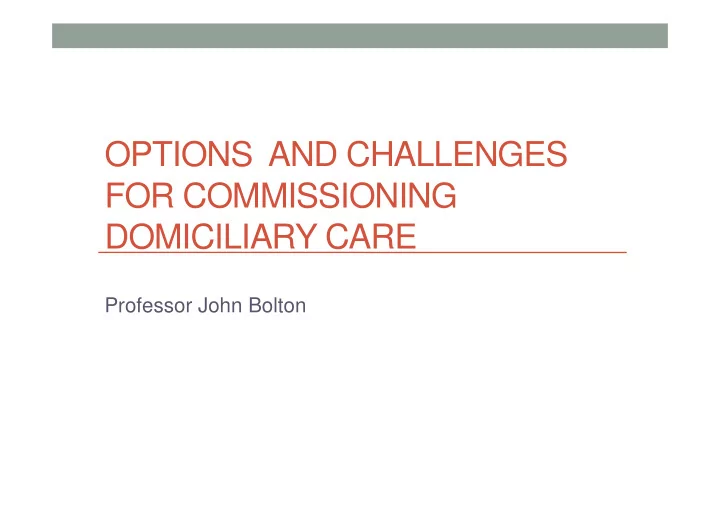

OPTIONS AND CHALLENGES FOR COMMISSIONING DOMICILIARY CARE Professor John Bolton
What crisis? • Domiciliary Care has been grossly underfunded by local authorities – and Domiciliary Care providers have been prepared (in the past) to take on contracts with councils where they cant afford to deliver the right service. • In addition • We need to reconsider what domiciliary care is and what is its purpose?
Has domiciliary care been over- proscribed? • There was significant over –proscribing of domiciliary care with no discernible improved outcomes • Low level care – tackling social isolation or just checking • Discharge from hospital • Partnership with carers • Care can be delivered in a way that further incapacitates the recipient or it can be enhancing and supportive – a “dollop of care” can increase someone's needs by 120%
Can we change Domiciliary Care? • Domiciliary Care is not “one” service but a range of different services from which we might expect different outcomes which need to be measured in relation to the outcomes delivered • The way in which we assess people for care and the way in which that care is delivered makes a big difference for the outcomes for the recipient • We should review who actually is in the best place to assess someone for a service – reablement/ therapist; longer-term/provider • We should hold providers to account for the outcomes they deliver within domiciliary care
Different dimensions to Domiciliary Care • Short-term recovery (domiciliary care reablement versus self- managed recovery) – hospital discharges? • Longer term recovery (evidence at which point do people recover and who will benefit) • Helping a person to live with / manage a long-term condition (or more likely set of long-term conditions) • Helping a person live with /manage having memory loss or dementia • Helping a person receive end of life care • Supporting a carer who is helping any of the above • Supporting a person with health care needs
The future? • Each of these are • very different types of services • with a different skill set required (specialist teams) • With a different set of outcomes from each service • If delivered well – they will reduce overall demand on social care capacity and there will be a good supply of carers who can be better paid.
More Information • Papers on Managing Demand and Outcome Based Commissioning: • http://ipc.brookes.ac.uk/publications/ • John Bolton • john.bolton@jrfb.co.uk • 07789748166
Recommend
More recommend